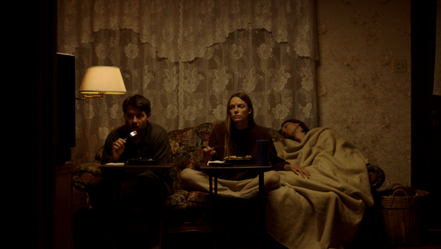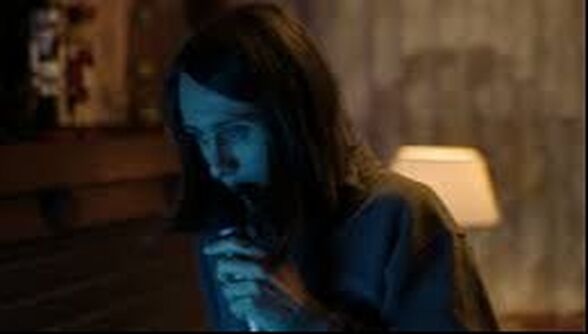 Making its North American Premiere at Nightstream this past weekend, writer/director Jonathan Cuartas brings a new approach to the vampire myth with his debut film My Heart Can’t Beat Unless You Tell It To... ...The title of the film seems like the name of a country song or a bad lyric from an emo anthem, but it actually refers to a family where one member becomes reliant on the others for survival. Many families live with a chronic illness in their home which requires non-stop observation, care, and sacrifices, and while this family goes through the normal care-routine associated with a terminal sickness, they also take extreme measures. How far would you go to alleviate a loved one’s pain or even keep them alive? Would you sacrifice your time? Your relationships? Would you sacrifice another person so your loved one could live? The film begins with Dwight (Patrick Fugit Almost Famous) taking a late-night drive into the city. While out, he finds a homeless man digging through a dumpster and offers him a ride and some food. The vagrant shows his suspicions for the kindness, but still accompanies Dwight back to his house. Unfortunately for the nameless man, Dwight does not want sexual favors—he wants blood. After incapacitating him, Dwight and his sister Jessie (Ingrid Sophie Schram) murder him and collect all his blood to help their sickly younger brother Thomas (Owen Campbell). Thomas appears sick and weak, his countenance gaunt and pale. He sustains himself on human blood and without it he collapses and vomits. Thomas must also sleep during the day because any contact with the sun causes his skin to burn. The youngest sibling remains bedridden and needs help drinking his bloody meal and bathing himself. Thomas’ illness controls the atmosphere of the house and, even though the younger sibling smiles and attempts to enjoy the life his brother and sister give him, the constant reminder of death covers the house in a dour tone where laughter and happiness do not actually exist. The close and minimalist framing forces the viewer’s perspective to narrow on the subject’s face, hand, or back making us intimate with the characters and their simple existence. The hallway shots resemble a Vermeer painting as the simplicity becomes the beauty. When not tending to their brother, Jessie works as a waitress and Dwight sells second-hand items to afford necessities and presents. No one in the family explains the process or busies the film with any dialogue to explain the situation. The viewer simply observes the three adult siblings going about their usual nightly chores. And since no one exists outside of their lives, the siblings never have reason to discuss their situation beyond “Thomas is sick”. His siblings love him and accept their obligation, but Dwight questions the morality of their actions. Or he at least pretends to. However, his frustrations seem to stem more from boredom and lack of actual human contact. So, Dwight goes out and pays a hooker to fulfill his lack of a relationship while Jessie typically stays home and keeps house and takes on roles Dwight seems to have no interest in doing, like entertaining and educating Thomas. The older brother becomes so desperate for outside relationships he pays the prostitute to talk to him and locks up the homeless Eduardo, an intended meal for Thomas. The captive does not speak English, but Dwight projects his own mind onto Eduardo. The lonely man converses with his prisoner and fills in what he wants Eduardo to say. Even Thomas becomes desperate for change, but Jessie refuses to expose the outside world to Thomas and vice versa. As the film progresses the tone switches to frustration. Dwight wants a relationship, Jessie wants to keep living the same life, and Thomas does not want to be sick anymore. The viewer will find themselves emotionally invested in the characters and their situation mostly because the nuances of the acting create a believable sibling bond. All three of the leads make the movie an emotional game of tug-of-war and Thomas’ sickness earns our sympathy even in his monstrosity. Jessie unquestionably accepts her role as a caregiver and in turn becomes an overbearing force to her family. And the frustrated Dwight is stuck somewhere in the middle. The older brother desperately wants out but cannot abandon his family. For a freshman offering, Cuartas provides an emotional film that takes a common horror myth and strips away all the glamour. My Heart Can’t Beat is a vampire film, but the vampire is not a sexy and all-powerful immortal who looks down on the weak humans. Instead, we witness a form of vampirism where the need for blood comes from a debilitating sickness that leaves the sufferer too weak to leave his house or even get out of bed. He is not a monster, but a sickly young man who lives a life absolutely dependent on his able-bodied siblings. The film follows a slow trajectory but provides death scenes throughout the story to keep the easily bored audience members interested. Perhaps not a horror movie in the traditional sense, the film plays with the emotions of a sibling bond and will leave some viewers tearful at the end. By Amylou Ahava Enjoy Amylou's writing? Leave her a tip here through Ko-fi!
0 Comments
Leave a Reply. |
Archives
March 2023
|


 RSS Feed
RSS Feed